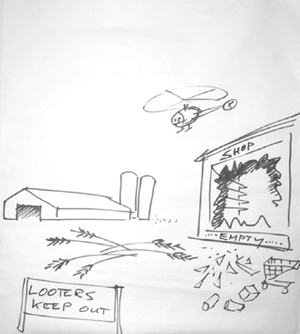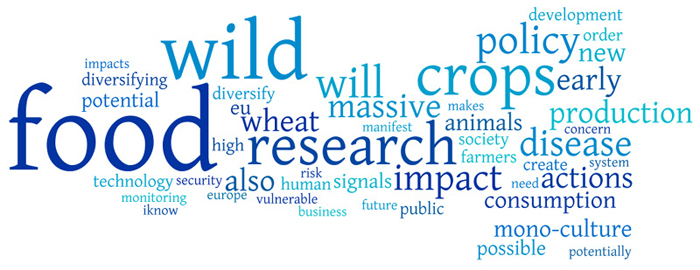004Wheat crisis hits humans and animals
Blue sky Policy Alert 004
| FP7 themes | health | agro | ict | nano | energy | environment | transport | ssh | space | security |
| ERA goals | mobility | infrastucture | rtd institutions | knowledge sharing | joint programming | cooperation |
| Author(s) | Joe Ravetz, Rafael Popper, Thordis Sveinsdottir, Yanuar Nugroho | |
| Contributor(s) | Martin Fatun, Peter Ellwood, Fiona Lickorish, John Reynolds, John Turnpenny | |
| Manifestation | Gradual development | Potential impacts in Europe infrastructures  people's lives  legislation & regulation  economy & business  defence & security  government & politics  environment & ecosystems  science & technology  |
| Importance for EU |  | |
| Strategic attention | by 2030  by 2050 by 2050  | |
| Type of impact | Very negative | |
| Inspired by | Brainstorming session and group discussions in the iKNOW Workshop in Manchester (February 2010) | |
| Related to | ||
| Keywords | Food, crops, disease, wheat, mono-culture, consumption, humans, animals | |
Wild card
This wild card (also called “wheat comes a cropper”) concerns the emergence of a new pest or disease which specifically targets wheat and wipes out the whole wheat crop. This leads to a severe worldwide shortage of a staple food for humans and animals. Because of the genetic mutation, emerges a new pest or disease that targets and destroys all wheat crop and this spreads quickly across the globe. The impact is severe as the worldwide food supply for humans and animals are in serious shortage. This happens as human (and animals alike) becomes overly dependent on one particular source of main food. Large farms with mono-culture crops dominate massive farming areas, which are, while producing lots of food, also creating alarming risks to humanity and the environment. This situation is created by market push which always seeks for cheapest sources of food but unintentionally creates a highly vulnerable system easy to break down. In addition standardisation in food and farming industry makes the whole system vulnerable.
Surprises ("wild" scenario features)
What make this a wild card? In general, over-reliance of human and animals alike on only a few species makes human life much more vulnerable. Any disruption that affects these species would create massive impact to humans and animals. While we have bigger farms around, actually what we also have is fewer suppliers in terms of variety/variance. This increases the risk as we rely more on less variance of foods. Another feature that makes this wild card feral is that with genetic engineering, advanced new pest/disease easily develops whose progress might escape our observation. As we only have mono-culture, we have no crop resistance when the disease spreads: the impact will be devastating. This situation will become worse when we only have smaller gene pool to breed new crops as we will not be ready if the wild card manifests.
Possible interpretations
 There are a number of possible conditions under which this event becomes wild. Firstly, that we now are living in a time-and-space in which we cannot completely eliminate risk. In other words, inherently, we live in a ‘risk society’ (as once coined by Ulrich Beck). In such society what constitute risk are not only natural risks (like natural disaster: flood, earthquakes, tsunami, etc.) but also what Giddens terms as ‘manufactured’ risks (i.e. human-made or human-induced catastrophe like computer virus attack, nuclear reactor leakage, etc.). Secondly, in light of that, we now actually rely on too few food sources to feed the population. These sources are humanmade/ genetically modified/enhanced mono-culture crops. Disruptions to these sources will consequently have massive impact on the survival of human beings. In addition, we do not really have monitoring programmes for disease development.
There are a number of possible conditions under which this event becomes wild. Firstly, that we now are living in a time-and-space in which we cannot completely eliminate risk. In other words, inherently, we live in a ‘risk society’ (as once coined by Ulrich Beck). In such society what constitute risk are not only natural risks (like natural disaster: flood, earthquakes, tsunami, etc.) but also what Giddens terms as ‘manufactured’ risks (i.e. human-made or human-induced catastrophe like computer virus attack, nuclear reactor leakage, etc.). Secondly, in light of that, we now actually rely on too few food sources to feed the population. These sources are humanmade/ genetically modified/enhanced mono-culture crops. Disruptions to these sources will consequently have massive impact on the survival of human beings. In addition, we do not really have monitoring programmes for disease development.
Key actors
Key actors related to this wild card, include:- Scanners or "early warners" such as researchers who monitors the spreading of crop diseases; scientists who should start thinking of diversifying food resources rather than attempting to create mono-culture, high-yield crops for the sake of food industrial efficiency and productivity.
- Shapers (i.e. enablers/inhibitors) : governments who should provide not only with regulatory framework on crops production but also encouragement through incentives for farmers and food industry for more diversification.
- Stakeholders positively or negatively impacted include : farmers will be impacted since they are the central actor in the food supply-chain and play a critical part in providing food for humans and animals; consumers and the general public will suffer from the lack of food supply and from the massive social unrest if this wild card manifests. In this situation, the police are to deal with the societal impact, especially when food supplies run out and public restlessness (and probably riot) take place.
Potential impacts
What could possibly be the impacts of this wild card? It is envisaged that the impact would be massively affecting the society, for example: (1) massive civil unrest because of massive disruption of markets for food/feedstuffs; (2) high food prices due to this wild card, which will create trade barriers to protect individual countries’ interest; (3) starvation, especially in the west thus forcing western countries to rely on others for food; and (4) massive needs to move to other staple crops – whose prices rise. These impacts will force people to rethink about genetically-modified (GM) crops, from GM as the cause of this massive disaster, to GM as possible solution for survival. It is also worth-noting that, at many fronts, it is the developing countries that have to bear the brunt.
Potential actions
What actions need to be taken before and after the wild card? This very much lies on the very idea of having a more reliable system which does not have to rely too much on mono-culture food crops. One possible potential action is building public awareness to grow their own foods. At a more massive level, policy should encourage farms to diversify crops they produce. Another possible policy direction is for the governments to back up the plan to build up and fund, or to continue, the establishment of gene banks which will store the varieties of genes. In different direction, an action could be to have policy which needs to reserve bio-fuels trend which contributes to the tendency of massive mono-culture crops. In a more detailed account these actions can be specified below.
- Policy actions
Early actions: Policy to (1) encourage/incentify general public to grow their own food and farmers to diversify crops; (2) reverse biofuels trend; (3) create access to diverse markets; (4) have contingency (countermeasures) plan to loss of feedstock.
Early reactions: Once manifested, policy is needed to (1) devise quarantine procedures for early action plan; and (2) to ensure early identification of disease outbreak
- Business actions
Early actions: For business, it is important to attend to research on related issues, as well as to take responsibility in monitoring for possible disease mutations
Early reactions: Once manifested, business need to think of a new system to redistribute food, and to have production/research resources ready to act.
- Research actions
Early actions: Some research agenda before the wild card manifests are: building up gene banks; development of wide range of crops as some of them may be resistant to the disease; increasing R&D on GMO on wild wheat; research on genetically enhanced crops resistant to disease; better understanding of institutional barriers to use of foresight knowledge; monitoring disease development/migration; monitoring risks of all monoculture; sharing information on risks, strategies, etc.; and Map potential effects and viability of shifts to new food resources.
Early reactions: Once the wild card happens, research should focus on the dietary change impact and anticipate for public attitude shift.
Weak signals
Weak signals Some signals are identified, if these emerge individually or in combination with others, we have to be ready for the wild card to manifest. These signals might be: (1) localised outbreak in an area which is not monitored; (2) Climate change which causes an existing disease to mutate; (3) bioterrorism attack or unintentional lab release that contaminates the farms; (4) the increasing amount of large areas of mono-culture that allows rapid spread of disease/pest; and (5) the more intensive hi-tech farming methods that reduce crop resistance.